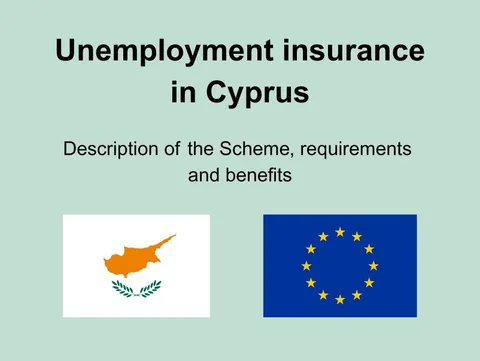EU
Cyprus
Unemployment
Insurance
Unemployment Insurance in EU->Cyprus
Unemployment insurance in Cyprus
This article contains what you need to know about unemployment benefit in Cyprus.
In what situation can I claim?
Unemployment benefit is paid to workers or to voluntarily insured people working for a Cypriot employer overseas, 16 to 63, who are unemployed. The limit is extended to 65 if the insured person is not entitled to a statutory pension. The self-employed are not entitled to unemployment benefit.
What conditions do I need to meet?
The insurance conditions for the payment of unemployment benefit are:
- to have actual basic insurance equal to at least 0.50 of the insurance point and for at least 26 weeks to have elapsed since the insurance commenced; and
- to have actual or assimilated insurance equal to at least 0.39 of the insurance point in the relevant contribution year.
The person must also:
- be unemployed;
- not be engaged in work from which he or she earns more than 1/12 of the amount of the basic insurable earnings (€16.80 per day for 2024);
- have registered as a job-seeker and be available to the Public Employment Service;
- have registered as unemployed at the district social insurance office to which he or she will report regularly;
- be capable of work;
- be available to work.
An unemployed person who has exhausted the entitlement to unemployment benefit (i.e. who has been paid benefits for 156 days) requalifies to receive the benefit if, after exhausting the right, he or she has been employed for at least 26 weeks and has paid contributions which, in total, are not less than 26 times the weekly amount of basic insurable earnings.
If the unemployed person is over 60 and is not eligible for a pension from an occupational scheme, he or she requalifies for unemployment benefit after working for at least 13 weeks rather than 26, having paid contributions on insurable earnings which, in total, may not be less than 26 times the weekly amount of basic insurable earnings.
What am I entitled to and how can I claim?
Unemployment benefit is paid for a period not exceeding 156 days in each period of unemployment.
The weekly unemployment benefit rate is the same as the sickness benefit rate and is calculated in the same way. It is composed of a basic and a supplementary benefit.
The spouse (regardless of gender) is deemed to be dependent if receiving wages or benefits of smaller value than the increment for a dependent person. Where both spouses are entitled to benefits at the same time the increment for dependants is paid only to the spouse who is entitled to benefit increment at the higher rate.
| Basic benefit | Supplementary benefit | |
| In% of the weekly value of the insurance points in the basic insurance during the relevant contribution year | In% of the weekly value of the insurance points in the supplementary insurance during the relevant contribution year | |
| Applicant | 60% | 50% (cannot exceed the weekly amount of the basic insurable earnings) |
| Dependent member: 1 (spouse) | 80% | - |
| Dependent members: 2 | 90% | - |
| Dependent members: 3 (maximum) | 100% | - |
If no increase is paid for a dependent spouse, then a 10% increment is paid for each of up to two dependants.
In order to receive this benefit you must be registered with the Public Employment Service as a job-seeker and sign the unemployment register at the district social insurance office.
Unemployment benefit is paid from the 4th day of unemployment, or, in the case of people working overseas on behalf of a Cypriot employer, the benefit is paid from the 31st day.
Jargon busters
- Basic insurance: includes the insurable earnings for each year up to the amount of the basic insurable earnings i.e. up to 1 point.
- Supplementary insurance: includes insurable earnings for each year above the amount of the basic insurable earnings.
- Insurance points: the result arrived at by converting real and assimilated insurable earnings to insurance points.
- Relevant contribution year: in relation to benefits, this means the last contribution year before the benefit year which includes the date on which the insurance conditions attached to the benefit must be satisfied (i.e. the relevant contribution year is 2022 for the first half of 2024 and 2023 for the second half of 2024).
- Benefit year: the period of time which commences on the first Monday of July each year and ends on the last Sunday before the first Monday of July in the following year.
Forms you may need to fill in
https://www.gov.cy/service/aitisi-gia-epidoma-anergias/
Know your rights
The links below define your rights legally.
Who do you need to contact?
Social Insurance Services
Headquarters
Spyrou Kyprianou 26
1075 Nicosia
CYPRUS
Website of the Department of Social Insurance Services
This page was last updated in 2024.
- Unemployment insurance in Europe →
Unemployment Insurance in Cyprus
You might also be interested in:
⇒EU social security coordination
⇒Unemployment Insurance in the Nordic countries
Key points of EU Unemployment Insurance coordination
- Transferring periods of work and insurance between EEA countries As an EU citizen you can transfer acquired rights from Unemployment Insurance when moving between EU/EEA contries. In this way it may be easier to become entitled to unemployment benefit in the country you move to.
In the vast majority of the Member states the aggregation rule become fully applicable as soon as you starts to work in the country. However in Denmark, Belgium and Finland you must work some period there before you can use the aggregation rule.
You need a PD U1 document in the country you leave or if the involved countries use electronically exhange (EESSI) there will be issued a SED U002. The countries who issues the highest number of PD U1 documents are Germany, Austria, Switzerland and the Netherlands. The countries who receives most PD U1 documents are Lithuania and Italy. - Transferring unemployment benefits Under certain conditions you can go to another EU country to look for work and continue to receive your unemployment benefits from the country where you became unemployed. The period you can export your unemployment benefits varies from 3 to 6 months in the different Member states.
You have to apply for a PD U2 document in the country you leave, or if you haven't done that the institution in the receiving country must request a SED U008 from the competent institution in your last country.
The countries who issues the highest number of PD U2 documents are Germany, Switzerland, the Netherlands and Denmark. Poland is the country who receives by far most PD U2 documents. - Unemployment benefits coverage According to OECD the net replacement of income after 2 months of unemployment, for a single person without children whose previous in-work earnings were 67% of the average wage varies from 33 percent (Ireland) to 91 percent (Belgium). Read more here..
- Having residence in another EU country than where you work? According to EU social security coordination rules you must only be insured against unemployment in one country at a time. As a generel rule this country is where you work.
In Member states who have compulsory insurance, you will automatically be covered when you start working there.
However you may be insured by your country of residence if you are posted to a EU/EEA country or work in two or more EU/EEA countries at a time. In these situations you can not your self decide where to have unemployment Insurance, but you (or your employer) must apply for a PD A1 document which states in which country you are covered by social security, including Unemployment Insurance. Special rule also apply for cross-border workers ("frontier workers"). - Third-country Nationals working in EU/EEANON-EEA citizens are covered by Unemployment Insurance in the EU countries who have compulsory Unemployment Insurance. In countries with voluntary Unemployment Insurance (Denmark, Sweden and Finland) third-country nationals can become member of an Unemployment Insurance Fund.
In the most countries Third-country nationals can also use the EU Coordination rules when moving within EU/EEA (however not in Denmark, Iceland, Liechtenstein, Norway and Switzerland).
Third-country nationals in short-tem working relations often faces problems with actually get Unemployment benefits, even though they have contributed to the system. This is due to the fact that one normally need a residence permit which allow one to take any job, and also because of a qualifying period in most countries between 6-12 months.

